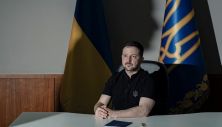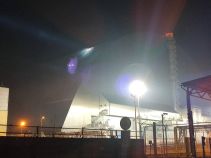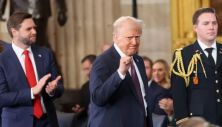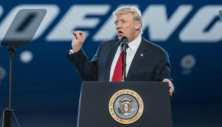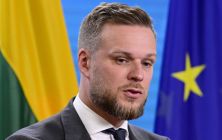President of Ukraine Volodymyr Zelenskyy has responded to U.S. Secretary of State Marco Rubio's statement about the need for concessions from...
Vous n'êtes pas connecté
- English
- Français
- عربي
- Español
- Deutsch
- Português
- русский язык
- Català
- Italiano
- Nederlands, Vlaams
- Norsk
- فارسی
- বাংলা
- اردو
- Azərbaycan dili
- Bahasa Indonesia
- Հայերեն
- Ελληνικά
- Bosanski jezik
- українська мова
- Íslenska
- Türkmen, Түркмен
- Türkçe
- Shqip
- Eesti keel
- magyar
- Қазақ тілі
- Kalaallisut ; kalaallit oqaasii
- Lietuvių kalba
- Latviešu valoda
- македонски јазик
- Монгол
- Bahasa Melayu ; بهاس ملايو
- ဗမာစာ
- Slovenščina
- тоҷикӣ ; toğikī ; تاجیکی
- ไทย
- O'zbek ; Ўзбек ; أۇزبېك
- Tiếng Việt
- ភាសាខ្មែរ
- རྫོང་ཁ
- Soomaaliga ; af Soomaali
Rubriques :
 Maroc - EURASIAREVIEW.COM - A la une - Aujourd'hui 01:13
Maroc - EURASIAREVIEW.COM - A la une - Aujourd'hui 01:13
Twenty Five Years Of Vladimir Putin – Analysis
By Ajay Kamalakaran On the evening of December 31, 1999, few in Russia knew what its first president was going to say in a recorded televised speech. The country, which was still in the financial doldrums because of its debt default, watched as Boris Yeltsin resigned. “We are creating a vital precedent of a civilized and voluntary transfer of presidential power to a newly elected president,” Yeltsin said[1]. And yet, I have taken a different decision: I am leaving before the end of my term.” He added, “In accordance with the Constitution, I have signed a decree giving the powers of president of Russia to Prime Minister Vladimir Putin. He will be the head of state for three months, after which presidential elections will be held, also in accordance with the Constitution.” From the beginning of the new millennium, Putin has been Russia’s undisputed leader, serving as president for the entire period, except from 2008 to 2012, when he was prime minister to avoid violating the then two-term constitutional limit for the country’s highest office. In 1999, when Putin was handed over the reins of power, the country’s GDP was $1,331[2] per capita. The IMF’s World Economic Outlook estimates[3] that in 2025, this number will touch $16,077 or, and $48,957 on a PPP basis. For Russia watchers who have been living in and observing the country for the last two decades, it is hard not to notice the incredible changes that it has witnessed in this time period. At the beginning of Putin’s presidency, Russia looked like a former empire in decline – crumbling infrastructure, rampant alcoholism, street crime, often violent, extremist political movements and general disenchantment. In the Putin era, Russian cities have undergone a dramatic revival, turning into clean, restored, efficient and beautified urban spaces with expanded and safe multi-modal public transport. The development has spread far beyond Moscow and St. Petersburg. For instance, the East Asian city of Vladivostok was chosen as the host[4] of the APEC Summit. Two new suspension bridges were built to link the city to outlying areas, and its main university was expanded to accommodate a growing number of foreign students from countries such as India. Sochi, the Black Sea resort city, got a much-needed makeover in time for the 2014 Winter Olympics[5]. Foreign media was quick to point out flaws in Russia’s organisation of the sporting event, prompting Putin to take personal care to ensure that the 2018 FIFA World Cup, hosted across Russian cities, became the gold standard. It was during this event that football fans from across the world got a chance to see – and fall in love with – contemporary Russia. The urban revival has stretched to second and third tier, distant cities that for decades lacked Moscow’s attention. One such is Astrakhan[6], which is close to the Caspian Sea and an important part of the International North South Transport Corridor. The rural areas of Russia have not witnessed the kind of large-scale transformation as have its cities. Nearly a quarter of the population[7] of the country lives in rural areas. Over the last decade, the government has increasingly shifted its focus on the countryside, given the growing need for food security in a sanctioned world. In 2024, $144 million was allotted[8] by the government for preferential lending programs aimed at improving housing, transportation and living standards in rural Russia. However, inequality in Russia is relatively low: Russia’s Gini coefficient, a measure that represents income, wealth and consumption inequality in 2021 was 35.1[9], suggesting a moderate level of inequality. On foreign policy, the early years of Putin’s presidency were marked with attempts to build trust and ties with the West. His personal friendship with then German Chancellor Gerhard Schroeder paved the way for the construction of the Nord Stream 1 pipeline. The Russian President also enjoyed warm ties with George W. Bush, who was one of 50 heads of state at the World War II Victory Day parade in Moscow. Bush was joined by French President Jacques Chirac, Japanese Prime Minister Junichiro Koizumi and India’s Manmohan Singh. In the early 2000s, Russia and NATO were increasingly looking at boosting cooperation, forming the NATO-Russia Council[10] in 2002. This was termed “a consultation, consensus-building, cooperation, joint decision making and joint action,” where individual NATO member states and Russia worked “as equal partners on a wide spectrum of security issues of common interest.” Russia’s critical interests were attacked during the Barack Obama administration when American officials aggressively pursued a regime-change in Kiev. In 2013, the US Assistant Secretary of State for European and Eurasian Affairs, Victoria Nuland openly admitted[11] at the US-Ukraine Foundation Conference that Washington was sponsoring the events at the Maidan in Kiev that would eventually lead to a coup and the installation of a US-friendly regime[12]. Washington’s increased interference in Ukraine after the 2014 coup, and persistent meddling in other former Soviet republics like Georgia killed any hopes of this Council achieving any of the goals it had set out. While reaching out to the West, Putin made it a cornerstone of his foreign policy to simultaneously revive sagging ties with India and to remove mistrust with China. It was under the leadership of Putin and Atal Bihari Vajpayee that India and Russia signed the Declaration[13] of Strategic Partnership, and began the exercise of holding annual summits. Top-level meetings are also held annually under the Indo-Russian Inter-Governmental Commission (IRIGC) mechanism. One of Putin’s greatest foreign policy successes was the final settlement of the Russia-China boundary dispute. In 2004, the countries signed the Complementary Agreement[14] on the Eastern Section of the Russia-China Boundary. As a part of the agreement, Russia handed over half of the Tarabarov (Yinlong) Island, as well as the Bolshoy Ussuriysky Island and a few islets on the confluence of the Amur and Ussuri rivers. The countries, which share a 4,209-kilometre border, now have more than 160 functional border crossings. The relationships built by Putin with China and India were crucial for the balanced positions the countries took when Crimea became a part of Russia. The Asian giants also refused to join Western sanctions imposed on Russia as a result of the Ukraine crisis. While the country’s isolation from the West has been irksome for some members of the political, bureaucratic and business elite, Moscow has offset this partially with its growing ties with Asia through setups like the Shanghai Cooperation Organisation and other emerging powers through BRICS and BRICS-plus. In an ideal world, Russia would enjoy the kind of relations with the West it did in May 2005, when Moscow hosted world leaders for the 60th anniversary of World War II Victory Day. But its critical security interests have been challenged by the West, making it difficult. The Russia-U.S. talks in Saudi Arabia to end the war in Ukraine, may help mend strained ties. Despite concerns over the Ukraine crisis prolonging and inflationary pressures at home, Putin’s approval rating[15] hovers over 80 per cent. As with most countries, it’s about the economy; life and living standards have improved drastically over the last 25 years. Most Russians would not trade this away for the instability and crises of the Yeltsin era. Opponents propped up the West are seen as those ready to take Russia back to the 1990s when food and housing were scarce. One of Russia’s greatest successes in the Putin era was the revival of agriculture. In 2005 the Russian government identified agriculture as a national priority area. From being an importer of food grains in the late 1990s, Russia went on to become a major global supplier, with exports of grain and processed grain products touching 83.5 million tonnes[16] in 2024, according to Russian agricultural watchdog Rosselkhoznadzor. Another factor in Putin’s popularity at home has been his constant support for what is accepted as “traditional Russian spiritual and moral values.” An official presidential decree[17] to this extent was issued in 2022. “Traditional values include life, dignity, human rights and freedoms, patriotism, citizenship, service to the Fatherland and responsibility for its fate, high moral ideals, a strong family, creative work, the priority of the spiritual over the material, humanism, mercy, justice, collectivism, mutual assistance and mutual respect, historical memory and continuity of generations, the unity of the peoples of Russia,” the decree said. The 2022 presidential decree stressed the importance of religion for the country: “Christianity, Islam, Buddhism, Judaism and other religions, which are an integral part of the Russian historical and spiritual heritage, have had a significant impact on the formation of traditional values common to believers and non-believers. Orthodoxy plays a special role in the formation and strengthening of traditional values.” In Putin’s era, Russian Orthodox monasteries and churches have been revived across the country and programs on state television have promoted a return to religion. State support has also been extended to mosques and Buddhist monasteries. For instance, the old Cathedral Mosque was demolished in 2011 to make way for a new modern structure that houses 10,000 worshippers. For the opening ceremony of the new building in 2015, Putin was joined by Palestinian leader Mahmoud Abbas and Turkish President Recep Tayyip Erdogan. This emphasis on traditional values has also extended to making it easier for those who want to migrate to Russia. A 2024 presidential decree[18] grants even those who are not proficient in the Russian language or history temporary resident permits. It specifically invites those foreigners who reject “the policies implemented by countries that impose destructive neoliberal ideological attitudes that contradict traditional Russian spiritual and moral values.” This could be a simultaneous way of building goodwill with people of foreign countries, while addressing the demographic needs. A quarter of a century after Putin became Russia’s president, a large number of Russians see this as an era of revival and regeneration after a decline that began from the days of Perestroika. About the author: Ajay Kamalakaran is a writer with a special interest in Russia and the former Soviet Union. Source: This article was written for Gateway House: Indian Council on Global Relations. References [1] “Statement by Boris Yeltsin” President of Russia, December 31, 1999, http://en.kremlin.ru/events/president/transcripts/24080 [2] “GDP growth (annual %)-Russian Federation”, World bank Group Data, https://data.worldbank.org/indicator/NY.GDP.MKTP.KD.ZG?locations=RU [3] “World Economic Outlook Database”, International Monetary Fund, https://www.imf.org/en/Publications/WEO/weo-database/2024/October/weo-report?c=922,&s=NGDP_RPCH,NGDPD,PPPGDP,NGDPDPC,PPPPC,PCPIPCH,&sy=2022&ey=2029&ssm=0&scsm=1&scc=0&ssd=1&ssc=0&sic=0&sort=country&ds=.&br=1 [4] “2012 APEC Ministerial Meeting”, Asia-Pacific Economic Corporation, September 5-6, 2012, https://www.apec.org/meeting-papers/annual-ministerial-meetings/2012/2012_amm [5] “Sochi, Ru-2014”, Olympics, https://www.olympics.com/en/olympic-games/sochi-2014 [6] Ajay Kamalakaran, “Astrakhan is India’s Gateway to Russia”, Gateway House, July 20,2022, https://www.gatewayhouse.in/astrakhan-indias-gateway-russia/ [7] “Rural population (%of total Population)”, World Bank Group Data, https://data.worldbank.org/indicator/SP.RUR.TOTL.ZS [8] “More than 14 billion rubles have been allocated to support preferential lending programs for rural areas”, Government of Russia, December 11, 2024, http://government.ru/news/53688/ [9] “Gini Index”, World Bank Group Data, https://data.worldbank.org/indicator/SI.POV.GINI [10] “NATO Russia Council”, North Atlantic Treaty Organisation, Last updated, July 25, 2024, https://www.nato.int/nrc-website/en/about/index.html [11]U.S. Department of State, December 2013, http://www.state.gov/p/eur/rls/rm/2013/dec/218804.htm [12] “Since Ukraine’s independence in 1991, the United States has supported Ukrainians as they build democratic skills and institutions, as they promote civic participation and good governance, all of which are preconditions for Ukraine to achieve its European aspirations,” Nuland said at the conference. “We’ve invested over $5 billion to assist Ukraine in these and other goals that will ensure a secure and prosperous and democratic Ukraine.” [13] “Declaration on Strategic Partnership between the Republic of India and the Russian Federation”, Ministry of External Affairs, Government of India, https://www.mea.gov.in/Images/pdf/DeclerationStrategicPartnership.pdf [14] “Supplementary Agreement between the Russian Federation and the People’s Republic of China on the Russian-Chinese state border in its eastern part (concluded in Beijing on 14.10.2004)” https://web.archive.org/web/20110812092950/http://bestpravo.ru/fed2004/data03/tex14451.htm [15] Denis Volkov, “Are meaningful public opinion polls possible in today’s Russia”, Yuri Levada Analytical Centre, April 24, 2023, https://www.levada.ru/en/2023/04/24/are-meaningful-public-opinion-polls-possible-in-today-s-russia/ [16] “Results of 2024: Grain export, state quality monitoring, combatting false declarations”, Federal Service for Veterinary and Phytosanitary Surveillance, December 24, 2024, https://fsvps.gov.ru/news/itogi-2024-jeksport-zerna-gosudarstvennyj-monitoring-kachestva-borba-s-nedostovernym-deklarirovaniem/ [17] “Decree of the President of the Russian Federation dates 09.11.22, No. 809”, President of Russia, http://www.kremlin.ru/acts/bank/48502 [18] “Decree of the President of the Russian Federation dates 19.08.24, No. 702”, President of Russia, http://www.kremlin.ru/acts/bank/51035
Articles similaires
Russian drone hits shelter covering Chornobyl NPP unit 4 last night – Zelenskyy
A Russian attack drone with an explosive warhead struck the shelter covering the destroyed Unit 4 of the Chornobyl nuclear power plant (NPP) on the...
Trump says U.S. making progress in talks to end Russia-Ukraine war
U.S. President Donald Trump believes that the United States is making progress in in its talks to end the war between Russia and Ukraine but...
Four Scenarios For Securing Peace In Ukraine – Analysis
By Tatiana Vorozhko U.S. President Donald Trump is pushing for a peaceful resolution to Russia’s now three-year full-scale war in Ukraine. VOA...
Trump aims for ceasefire in Ukraine by Easter – Bloomberg
The administration of U.S. President Donald Trump aims to reach a ceasefire agreement in Ukraine by Easter, which falls on April...
Putin is serious about negotiating peace in Ukraine, Kremlin says
MOSCOW (Reuters) - The Kremlin said on Tuesday that Russian President Vladimir Putin was serious about negotiating a settlement to end the war in...
Kremlin’s Militarization Of Russia’s Youngest Has Far-Reaching Consequences – Analysis
Russian educational institutions, especially kindergartens and early childhood education, have been militarized since the start of Russian President...
No Deals Without Us, Zelenskyy Says In Response To Trump-Putin Call On Ukraine
(RFE/RL) -- Ukrainian President Volodymyr Zelenskyy has reacted sharply to U.S. President Donald Trump's agreement with Russian President Vladimir...
Europe still lacks political will to help Ukraine in full – former Lithuanian foreign minister
Europe has enough power and resources to help Ukraine win, but it still lacks political will, which may result in an unfavorable "peace deal" being...
Peace In Europe Is Only Possible Under Trump – OpEd
After depending on America as its ally for decades, the European leaders at the Munich Security Conference this week now see first hand the...
Les derniers communiqués
-
Adobe Brings Conversational AI to Trillions of PDFs with the New AI Assistant in Reader and Acrobat
Adobe - 21/02/2024
-
Laura Frigenti takes the Helm as Chief Executive Officer of the Global Partnership for Education
Global Partnership for Education - 05/12/2022
